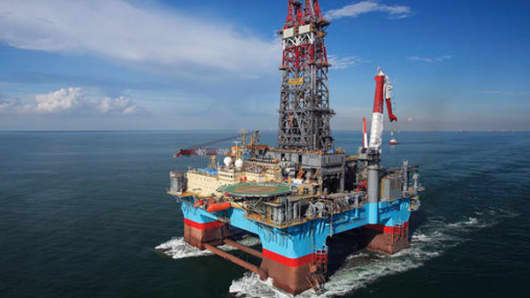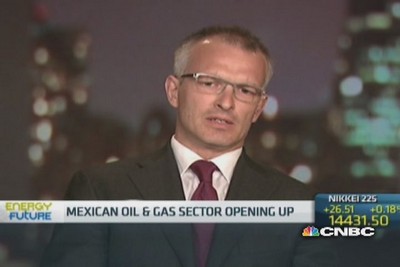Page added on April 27, 2014
Oil firms’ answer to global calamity: Insurance

The crisis in Ukraine has provided a reminder of an an old story: The world is a dangerous and unstable place—and some of the most volatile places on earth are oil-producing areas where oil companies are compelled to drill.
That stark backdrop means oil companies must insure against any number of adverse developments, all while prospecting for black gold in countries like Venezuela, Iraq and Nigeria. In a world where risks are mounting, threats are increasingly less conventional.

“While there’s a lot going on in the U.S., the new exploration is all occurring in the most challenging countries and most high-hazard environments out there,” said Chris Beck, president of Clements Worldwide, an insurance company that sells coverage to global energy companies.
“The reality of a lot of those countries is there a tremendous amount of economic instability and inequality,” Beck said in an interview. Russia will continue to “re-establish its dominance in the region, and that will have a destabilizing impact on other countries” in Eastern Europe and central Asia, he said.
Read MoreRussian revenge: Some Western firms could face retaliation
While political uncertainty has been the order of the day in oil-producing countries, Beck said calamity can come from anywhere. Scenarios can include anything from a tanker hijacked off the coast of Africa, to a pipeline explosion in the perennially unstable Middle East, or even cyber terrorism.
Despite soaring domestic production that has sent U.S. oil reserves to their highest level in nearly 40 years, the U.S. is far from immune from instability abroad. International demand means major oil companies must explore in unsavory places.
A recent report by Securing America’s Future Energy and Roubini Global Economics underscores how vulnerable the U.S. is to supply disruptions abroad. The survey noted that rising domestic production has helped the world’s largest economy become more secure, “but heavy oil use leaves the economy vulnerable to high and volatile oil prices.”
The report added that outages in Iran, Iraq, Nigeria and Libya have driven global spare capacity down to 1.7 million barrels per day – a level that gives “a very limited amount of flexibility in the event of further outages.”
Beck echoed those findings, saying that domestic production alone was not enough to insulate big oil producers from unstable markets.
“It’s not just the U.S.’s energy needs…it’s the global need,” Beck said. “Irrespective of relative energy needs in the US, there will be a significant ramp-up in other places. That requires [U.S. oil companies] to be in these hazardous environments.”
That can cost a pretty penny. Beck said oil and gas companies can pay tens of millions for premiums to insure against a host of disasters, with prices determined by several factors. In hotspots like Libya and Iraq, pipeline security is a big issue, as are ransom and kidnappings, to name a few.
“It’s not just about pricing, it’s about risk management,” Beck said, adding that Clements’ strategy is to “develop processes and procedures to prevent there being a loss, as opposed to simply reimbursing them after a loss.”
The ability of oil companies to hedge against global risk is complex because the nature of those threats is diffuse and unpredictable. Beck, however, said they have one element in common.
“The roots of instability are all economic,” he said. “It’s that level of economic instability and insecurity that we have to pay close attention to now as we look at pricing of political violence coverage, and policies to protect operations in that developing part of the world.”
–By CNBC’s Javier E. David
4 Comments on "Oil firms’ answer to global calamity: Insurance"



Makati1 on Sun, 27th Apr 2014 8:58 am
If we, (the US/West) were not destabilizing the world, there would be no problems. But, the US is losing the bidding war for the remaining oil and, therefore, it’s ruling place in today’s world. The Us/Western economy of consumption cannot afford $150 oil. The 3rd world can because they use it to produce real things for profit, not waste. They get more real ‘mileage’ out of their gallon/liter. But then, I’m sure some ‘American Patriots’ will disagree. So be it…lol.
Davey on Sun, 27th Apr 2014 9:13 am
Mak, “WE” you don’t qualify as western anymore. According to your propagandist tendencies you are for or against the west. Tird world in which you live has little future with or without high oil prices. They will be bid out of the game quickly. This is happening to the poor in the west with wealth transfer policies. Mak, you need to brush up on finance please
bobinget on Sun, 27th Apr 2014 11:49 am
Including myself, inexpert opinion needs exposure too.
$150 oil will replace $100 oil as reality of
Climate Change, Peak Cheap Oil smacks us clean up-side our heads. The trick will be only timing, nothing else. As we swap various replacements for one transportation fuel, oil, others will see their own shortages. My guess, oil substitutes, at the rate we are going will take a year for every percentage increase per decade.. If oil prices decline, increased oil consumption will slow replacement fuel adaptation.
We, humanity, will deal with $150 oil the same ways we have always done, inflation or starvation, you choose.
bobinget on Sun, 27th Apr 2014 12:00 pm
It appears, Europe already has it’s electric trains.
GE asked Santa for a set for Christmas.
Big fight brewing across the pond.
If your interested;
http://www.businessweek.com/news/2014-04-25/ge-executives-to-meet-with-french-government-on-alstom-takeover